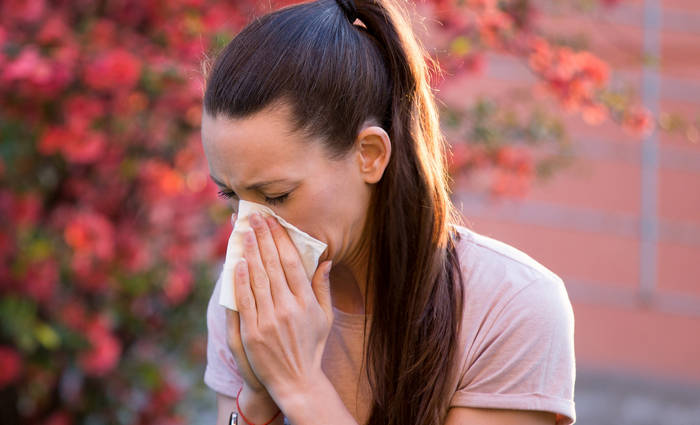What are the symptoms and treatment for allergies? Allergies are a widespread and diverse set of medical conditions that affect people of all ages, races, and genders. They occur when the immune system mistakes a normally harmless substance (allergen) for a dangerous invader, triggering an exaggerated response. This article aims to provide an in-depth understanding of allergies, detailing the symptoms, causes, and available treatment options.
Allergy – Mechanism, Symptoms, Risk factors, Diagnosis :
Symptoms of Allergies
Allergy symptoms can range from mild to severe and can affect different systems of the body. Here are some of the most common symptoms associated with various types of allergies:
Sure, here is a more detailed explanation of the symptoms of allergies:
Respiratory Symptoms
Respiratory symptoms are the most common type of allergy symptom. They are caused by the body’s reaction to allergens that are inhaled, such as pollen, dust mites, and mold spores.
-
Sneezing: Sneezing is a reflex that helps to clear the nose of irritants. Allergies can cause a sudden, uncontrollable urge to sneeze multiple times in a row.
-
Runny or stuffy nose: Allergies can cause a runny nose, which is the production of excess mucus. This mucus can be clear or yellowish and can cause a wet feeling in the nose and throat. Allergies can also cause a stuffy nose, which is a feeling of congestion in the nose.
-
Coughing and wheezing: Allergies can cause coughing and wheezing. Coughing is a reflex that helps to clear the throat of irritants. Wheezing is a whistling sound that is made when the airways are narrowed.
-
Shortness of breath: In severe cases, allergies can cause shortness of breath. This is because the inflammation caused by allergies can narrow the airways, making it difficult to breathe.

Skin Symptoms
Skin symptoms are another common type of allergy symptom. They are caused by the body’s reaction to allergens that come into contact with the skin, such as poison ivy, latex, and pet dander.
-
Itchy, watery eyes: Allergies can cause itchy, watery eyes. This is because the allergens trigger the release of histamine, which is a chemical that causes inflammation and itching.
-
Rashes: Allergies can cause rashes, which are red, raised areas of skin. Rashes can be caused by a variety of allergens, including food, medications, and insect bites.
-
Hives: Hives are raised, itchy welts that can appear anywhere on the body. They are caused by the release of histamine and can be triggered by a variety of allergens.
Gastrointestinal Symptoms
Nausea: Nausea is a feeling of sickness or discomfort in the stomach that can lead to vomiting. It is a common symptom of food allergies, particularly to shellfish, peanuts, tree nuts, eggs, milk, soy, and wheat. Nausea can also occur as a result of other types of allergies, such as to pollen, dust mites, or pet dander.
Vomiting: Vomiting is the forceful expulsion of stomach contents through the mouth. It is a more severe symptom of food allergies than nausea and is often associated with abdominal pain, cramping, and diarrhea. Vomiting can also occur as a result of other types of allergies, such as to medication, insect stings, or foodborne illness.
Diarrhea: Diarrhea is the frequent passage of loose or watery stools. It is a common symptom of food allergies, particularly to dairy products, gluten, and sugar alcohols. Diarrhea can also occur as a result of other types of allergies, such as to pollen, dust mites, or pet dander.
Other gastrointestinal symptoms: In addition to nausea, vomiting, and diarrhea, other gastrointestinal symptoms that can be associated with allergies include:
- Bloating
- Abdominal cramps
- Pain
- Gas
- Constipation
Ocular Symptoms
- Itchy or watery eyes
- Redness
Anaphylaxis
A severe, potentially life-threatening allergic reaction characterized by:
- Difficulty breathing
- Swelling of the face and throat
- Rapid drop in blood pressure
Causes of Allergies
Environmental Allergens
- Pollen
- Dust mites
- Mold
- Animal dander
Food Allergens
- Nuts
- Shellfish
- Dairy
- Eggs
Chemical Allergens
- Perfumes
- Cleaning agents
- Latex
Drug Allergens
- Penicillin
- Aspirin
- Antibiotics
Insect Allergens
- Bee stings
- Mosquito bites
- Cockroaches
Mechanism of Allergic Reactions
The immune system identifies an allergen and produces a type of antibody called Immunoglobulin E (IgE). This IgE attaches to certain cells called mast cells and basophils, which release chemicals like histamine when they encounter the allergen. This chemical release triggers the symptoms of an allergic reaction.
Diagnosis
Diagnosing allergies often involves a combination of the following:
- Clinical History: Understanding the patient’s symptoms and exposure history.
- Skin Test: Small amounts of suspected allergens are applied to the skin using a tiny needle.
- Blood Test: Measures the level of specific IgE antibodies in the blood.
Treatment Options
Avoidance
The best way to manage an allergy is to avoid the triggering allergen, which may involve lifestyle changes.
Medications
- Antihistamines: Block the action of histamine.
- Corticosteroids: Reduce inflammation.
- Epinephrine: Used in severe cases like anaphylaxis.
Immunotherapy
Also known as allergy shots, this involves the gradual introduction of the allergen to the body to build tolerance.
Alternative Therapies
- Acupuncture
- Herbal remedies (Consult a healthcare provider before starting any alternative treatments.)
Conclusion
Allergies are a complex interplay of genetic and environmental factors that trigger a misdirected immune response. Though they can be discomforting and, at times, severe, understanding the symptoms and causes is the first step in effective management. Various treatment options are available, which need to be tailored to the individual’s specific condition. Consultation with healthcare providers is essential for proper diagnosis and treatment.


